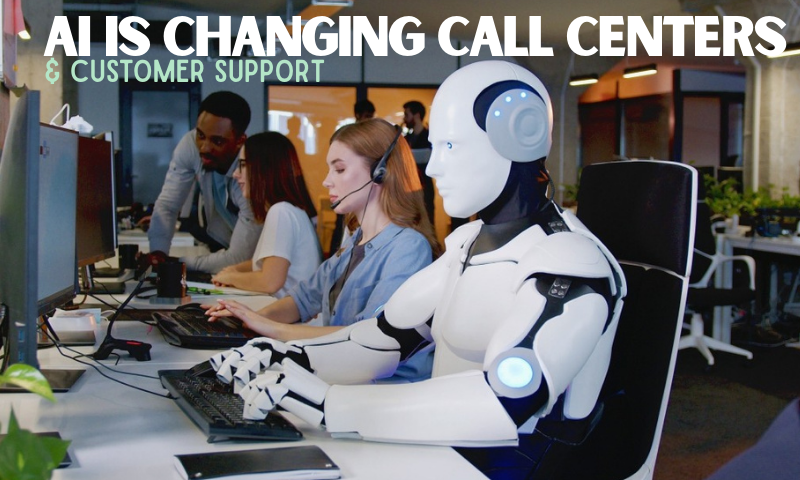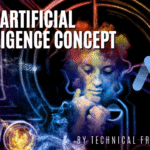AI is Changing Call Centers with smarter routing, personalization, and cost savings—transforming customer support in 2026.
In today’s fast-evolving digital ecosystem, AI is Changing Call Centers by revolutionizing how businesses deliver customer support. From smarter routing and personalized assistance to cost reductions and improved agent productivity, AI is no longer optional—it’s essential. Here’s a complete breakdown of how AI is transforming call centers and customer support in 2026.
1. 24 Hours Availability with AI-Powered Chatbots & Voice Agents
AI Is Changing Call Centers chatbots, voice agents, and virtual assistants are enabling round-the-clock customer support without needing extra staffing. These systems can manage routine queries, schedule callbacks, and even resolve issues autonomously, ensuring users always get help when they need it.
Key Points:
- Handles FAQs, account inquiries, and simple troubleshooting instantly.
- Works across multiple channels: phone, chat, email, and social media.
- Reduces customer wait time and improves satisfaction rates.
- AI Is Changing Call Center, voice agents mimic natural human speech, improving the customer experience.
Notably, AI Is Changing Call Centers, AI voice agents are becoming nearly indistinguishable from humans, thanks to advanced speech-to-text, text-to-speech, and large language models. Adoption is accelerating rapidly, with projections estimating that by 2028, 75% of new contact centers will embrace generative AI.
2. Intelligent Routing & Predictive Analytics
Gone are the days of “next available agent” systems. Today, AI-powered intelligent routing, paired with predictive analytics, ensures customers reach the best-suited agent quickly, based on factors like expertise, sentiment, history, and even mood. This enhances resolution speed and satisfaction while optimizing workflow.
Key Points:
- Matches callers with agents based on skill, history, and sentiment.
- Uses predictive analytics to forecast customer needs before the call.
- Improves first-call resolution rates.
- Reduces call transfer rates, saving time for both customers and agents.
3. Real-Time Agent Assist & Quality Assurance
Agent Assist AI tools lend real-time support to agents by providing prompts, suggested responses, and sentiment insights. Meanwhile, automated QA systems analyze every call for tone, compliance, and performance—giving managers and agents invaluable feedback for continuous improvement.
Key Points:
- Suggests best possible responses during calls or chats.
- Displays relevant knowledge base articles in real time.
- Automated QA analyzes tone, compliance, and issue resolution.
- Helps new agents perform better with less training time.
4. Hyper-Personalization & Emotion AI
AI today is not just reactive—it’s empathetic. Using emotion AI Is Changing Call Centers and sentiment analysis, virtual agents tune into emotional cues (like tone or punctuation) to deliver compassionate, context-aware support—especially crucial in sensitive industries like healthcare or insurance.
Key Points:
- Detects customer emotions using sentiment analysis.
- Adapts responses based on tone, mood, and urgency.
- Offers product or service recommendations tailored to customer history.
- Builds stronger customer loyalty by making support feel more “human.”
More Useful Posts for You!
5. Efficiency Boosts & Cost Savings
Adopting AI Is Changing Call Centers yields significant operational benefits:
Companies see up to 30–40% faster response times and around 25% lower operational costs.
Microsoft, for example, saved over $500 million in 2024 by integrating AI across call center functions—boosting agent productivity and sales.
This combination of cost savings and efficiency gains makes AI in call centers a powerful competitive advantage.
Key Points:
- Cuts operational costs by up to 25% through automation.
- Increases agent productivity by handling repetitive tasks.
- Reduces average handle time (AHT) significantly.
- Frees human agents for complex problem-solving and upselling.
6. Hybrid Human-AI Collaboration
Experts agree that the future lies in hybrid human-AI Is Changing Call Centers support systems—where AI handles routine tasks and human agents handle more nuanced, emotionally complex interactions. This collective intelligence approach ensures both scalability and empathy.
A mix of human empathy and AI efficiency ensures optimal results.
Key Points:
- AI handles repetitive, low-value tasks.
- Human agents deal with complex, emotional, or sensitive cases.
- Enhances scalability without losing the human touch.
- Improves job satisfaction for agents by removing monotonous tasks.
7. Unified AI Platforms & Orchestration
Leading AI platforms like NICE’s CXone Mpower unify AI tools across customer journeys—from routing and agent assist to automation and analytics. The new Orchestrator adds end-to-end AI automation, streamlining workflows and improving customer service holisticly. These advances are already earning industry recognition.
Integrated AI tools improve efficiency and customer journey flow.
Key Points:
- Platforms like NICE CXone Mpower combine multiple AI functions in one.
- Orchestration tools automate routing, reporting, and agent assist.
- Ensures consistent service quality across all communication channels.
- Provides deep analytics for continuous improvement.
8. Real-World Examples
Apple is experimenting with an AI “Support Assistant” inside its customer service app, initially rolled out in August 2025. While privacy-conscious, it automates basic help tasks and offers seamless escalation to humans when needed.
Teleperformance uses AI-powered accent neutralization tech developed by Sanas—offering real-time translation and noise cancellation to enhance clarity and customer satisfaction.
- Apple AI Support Assistant
- Automates basic customer queries inside its support app.
- Offers smooth escalation to a human when needed.
- Maintains privacy-focused AI usage.
- Teleperformance AI Accent Neutralization
- Uses real-time AI to make global support agents more understandable.
- Improves clarity in communication and boosts customer satisfaction.
- Includes noise cancellation and live translation features.
Final Thoughts
AI is fundamentally transforming customer support. From AI voice agents and predictive routing, to real-time agent assist and emotion-aware bots, businesses are delivering faster, smarter, and more human-centered service. However, the most successful models in 2025 and beyond will be those that balance AI efficiency with human empathy—hybrid systems designed for scalability and trust.







